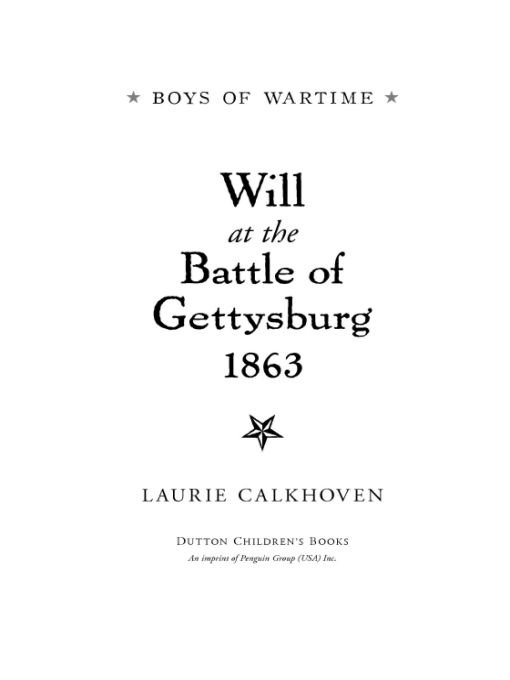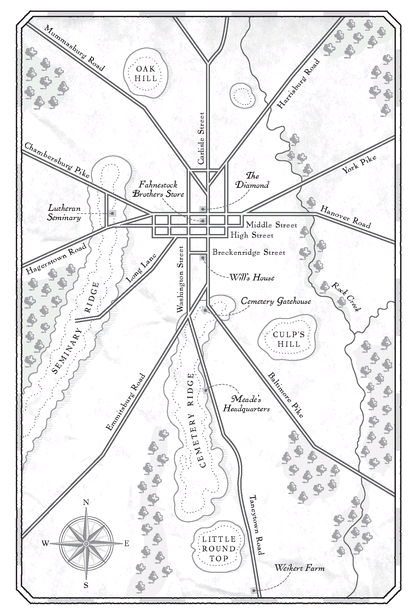Boys of Wartime: Will at the Battle of Gettysburg
Read Boys of Wartime: Will at the Battle of Gettysburg Online
Authors: Laurie Calkhoven

Table of Contents
Â
Â
Â

MAP
of
GETTYSBURG 1863
of
GETTYSBURG 1863

For Chris DuBois and Martha Levine, two warm and generous
friends, who were willing to cart a non-driver around the
battlefield. Thank you, thank you, thank you!
friends, who were willing to cart a non-driver around the
battlefield. Thank you, thank you, thank you!
DUTTON CHILDREN'S BOOKS
A division of Penguin Young Readers Group
Published by the Penguin Group * Penguin Group (USA) Inc., 375 Hudson Street, New York, New York 10014, U.S.A. * Penguin Group (Canada), 90 Eglinton Avenue East, Suite 700, Toronto, Ontario M4P 2Y3, Canada (a division of Pearson Penguin Canada Inc.) * Penguin Books Ltd, 80 Strand, London WC2R 0RL, England * Penguin Ireland, 25 St Stephen's Green, Dublin 2, Ireland (a division of Penguin Books Ltd) * Penguin Group (Australia), 250 Camberwell Road, Camber well, Victoria 3124, Australia (a division of Pearson Australia Group Pty Ltd) * Penguin Books India Pvt Ltd, 11 Community Centre, Panchsheel Park, New Delhi - 110 017, India * Penguin Group (NZ), 67 Apollo Drive, Rosedale, North Shore 0632, New Zealand (a division of Pearson New Zealand Ltd.) * Penguin Books (South Africa) (Pty) Ltd, 24 Sturdee Avenue, Rosebank, Johannesburg 2196, South Africa * Penguin Books Ltd, Registered Offices: 80 Strand, London WC2R 0RL, England
Â
Although this is a work of fiction, many of the historical events portrayed and persons named are real. The author has used history as a stage for several fictitious characters, and any resemblance of those characters to actual people is unintentional.
Â
Copyright © 2011 by Laurie CalkhovenÂ
All rights reserved. No part of this publication may be reproduced or transmitted in any form or by any means, electronic or mechanical, including photocopying, recording, or any information storage and retrieval system now known or to be invented, without permission in writing from the publisher, except by a reviewer who wishes to quote brief passages in connection with a review written for inclusion in a magazine, newspaper, or broadcast.
Â
The publisher does not have any control over and does not assume any responsibility for author or third-party websites or their content.
Â
CIP Data is available.
Â
Published in the United States by Dutton Children's Books,
a division of Penguin Young Readers Group
345 Hudson Street, New York, New York 10014
www.penguin.com/youngreaders
a division of Penguin Young Readers Group
345 Hudson Street, New York, New York 10014
www.penguin.com/youngreaders
Â
eISBN : 978-1-101-47574-4
Civil War
noun
1. A war between citizens of the
same country.
noun
1. A war between citizens of the
same country.

“A house divided against itself cannot stand.”
â
Abraham Lincoln, JUNE 1858
Abraham Lincoln, JUNE 1858
PROLOGUE
A Town at the Crossroads
W
hen the Founding Fathers of the United States gathered to write the Constitution that would govern their new country, they argued most fiercely over two things. First, how much independence should each state have? And second, should slavery be abolished or allowed to spread?
hen the Founding Fathers of the United States gathered to write the Constitution that would govern their new country, they argued most fiercely over two things. First, how much independence should each state have? And second, should slavery be abolished or allowed to spread?
Over time, those two arguments only grew worse. The South wanted to keep their slaves. Northern states made slavery illegal. Then Abraham Lincoln, an antislavery candidate, was elected President of the United States. Southern states were afraid the federal government would take their power away and force them to set their slaves free.
By the time Abraham Lincoln was inaugurated in 1861, seven Southern states had announced they were seceding, leaving the United States to form their own country. They called themselves the Confederate States of America. They were later joined by four more Southern states.
The North, led by Abraham Lincoln, declared secession illegal and a danger to the whole country. It would not be allowed. A war between the Union of the North and the Confederacy of the South began.
The American Civil War was in its third year by the summer of 1863, and things didn't look good for the Union. Even though Robert E. Lee's Confederate army was outnumbered by Union troops and short of food and weapons, they defeated the Union army over and over again.
On the heels of a victory in Chancellorsville, Virginia, Lee decided to march his army north. His plan was to cut Washingtonâthe North's capital cityâoff from the rest of the country. He hoped that a Union defeat in its own territory would force President Lincoln to bring the war to an end and allow the Confederate states to secede from the Union. Along the way, the undamaged farms of Maryland and Pennsylvania would feed Lee's hungry army.
Just over the Maryland border, the small town of Gettysburg, Pennsylvania, sat at the center of ten major roads. No one intended to fight there. In fact, the commanders of both armies had never even heard of the town of twenty-four-hundred people. But the citizens of Gettysburg were about to find themselves caught between two armies in the biggest, bloodiest battle of the war.
CHAPTER ONE
A Patch of Ground
Tuesday, June 16, 1863
Â
Â
Â
Â
T
he battlefield had no name that I knew of. Just a patch of ground somewhere in Virginia where our men fell up against some Rebs. Someone fired and soon there was an all-out battle. Messengers galloped to us, urging our company to hurry. The general at my side ordered me to signal the men to march on the double-quick.
he battlefield had no name that I knew of. Just a patch of ground somewhere in Virginia where our men fell up against some Rebs. Someone fired and soon there was an all-out battle. Messengers galloped to us, urging our company to hurry. The general at my side ordered me to signal the men to march on the double-quick.
I rattled my drum as we ran forward. The drumbeats urged the men to move faster. I could hear shells bursting ahead of us, along with muskets firing and the groans of men who got hit.
Suddenly, we were upon it.
My general nodded to me and I drummed the order to charge.
Rat-a-tat-tat. Rat-a-tat-tat.
Our color-bearer waved the Stars and Stripes, leading the men into battle. I was proud to see that there wasn't a coward among us.
All was chaos. Smoke from the heavy artillery guns made it impossible to see. A shell landed near my feet, and I dove behind a tree before it could explode and take my life. The smoke cleared just for a moment. A line of gray and steel advanced toward us like a serpent in the grass.
Then I saw it. Our flag was falling. Our color-bearer had been hit. I threw off my drum and dashed to him, dodging bullets that flew thicker than bees. I caught the flag just before it hit the ground. I would sooner die than have the Stars and Stripes fall into the hands of those who wanted to destroy the Union.
The color-bearer gazed at me with grateful eyes, and then slumped over dead.
I raised the flag high. “Courage, men!” I shouted.
The men had faltered. Now they rallied.
The general ran beside me, waving his sword. “There'll be a medal in this for you, boy, ifâ”
“William Joseph Edmonds,” my mother screeched. “If you don't stop your woolgathering and help me, I will tan your hide.”
Her words jerked me right out of my daydream. I wasn't on a battlefield. I was sitting at our kitchen table.
The twins, Sally and Jane Ann, set to giggling. They were just five, an age when the idea of a hide tanning was pure entertainmentâif the hide was not one of their own.
My fifteen-year-old sister, Grace, tugged me to my feet by the tuft of hair that was forever standing up on the top of my head. Bossy, she was. She dropped a smoked ham into my arms. “Will, take this to the cellar and hide it in the ash barrel.”
Mother had more chores. “And then ride Molasses to the Bailey farm. See if they can hide her along with their own horses. The Rebels will steal every horse they can.”
Mother was packing the good silver with the help of the twins. Her jewelry was already wrapped in a rag and hidden in a nook in the garret.
I got to work, although I didn't see the purpose. At least every other week since the war began someone rode through town with the news that the Rebels were coming.
They never did.
Nearest they got was Latshaw's Tavern when Jeb Stuart came into Pennsylvania with a raiding party last fall. They were back on the Southern side of Mason and Dixon's line before we even knew they were there.
Not that I would mind fighting the Rebs. There were plenty of twelve-year-old drummers. I saw no reason why I couldn't be one of them. I would have gladly mustered in with my brother, Jacob, when he went to be a soldier. But the government said you had to be eighteen to sign up without a parent's permission, and there was no way mine would allow it.
Other books
Career Girls by Louise Bagshawe
I Can't Believe He Was My First! (Kari's Lessons) by Zara, Cassandra, Lane, Lucinda
Charmed I'm Sure by Elliott James
Other Voices, Other Rooms by Truman Capote
B.u.g. Big Ugly Guy (9781101593523) by Yolen, Jane; Stemple, Adam
One Tempting Proposal by Christy Carlyle
Stand and Deliver by Swann, Leda
Redemption by Miles, Amy
Marja McGraw - Bogey Man 01 - Bogey Nights by Marja McGraw
The Cabinet of Curiosities by Paul Dowswell